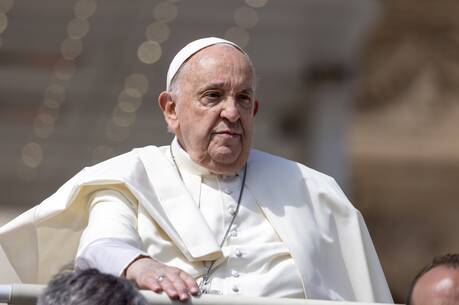St. Augustine was probably not the first, and he was certainly not the last to remark that even pagans believe that Jesus died. It is only Christians who believe that after death he rose to a new life. The joy that is awakened by this belief in the Resurrection is not supposed to be just a seasonal adornment, like an Easter bonnet or a new suit. When Pope John Paul II stopped in Harlem during his visit to New York in October 1979, he told those who came out to meet him, "We are an Easter people," and he led them in singing a triple alleluia.
But while it is true that Christians should radiate a certain Easter joy all year round, their Resurrection faith is very consciously reaffirmed at Easter time, and with good reason. Christianity can be viewed from many angles, and no particular perspective is the only possible one. All the same, the Gospel message can be powerfully proclaimed precisely as the answer to life’s ultimate problem, which is that of its own mortality.
No one denies that death is just what St. Paul called itthe final enemy that neither philosophy nor science can put down. The prospect of the indefinite continuation of the human race is not an answer to the problem of death. People want to be assured that in dying they will make a passage as distinct persons to an unimaginable form of a new life and glorified body. That is what Christians believe has been promised by Christ the Lord: "If anyone believes in me, even though he dies, he will live, and whoever lives and believes in me will never die" (Jn. 11:25-26).
Paul told the Corinthians that faith, hope and love are the three things that last (1 Cor. 13:12). That is to say, all three are indispensable on earth. In the world to come we shall no longer have to believe because we shall see. We shall no longer have to hope because we shall possess. We shall still love, however, but without the least inconstancy.
Good Christians can be steadily aware of their faith in God and their love for God without often thinking of their ultimate hope for heaven. That is because they are naturally preoccupied by their immediate hopes in this worldtheir concern for the work they have to do, for the people close to them, for the responsibilities they have to fulfill. One of the great blessings of Easter is the enlargement of our sense of purpose and direction. Hope for the kingdom coming rises at Easter time above our consciousness like a harvest moon rising above the countryside.
This hope is not a small-minded, self-centered disposition. Its first object is the collective salvation of the whole human family. Christians hope not just for themselves, but for all those they love and all whose lives have intersected with theirs and all with whom they share humanity. They hope God will save his church together with those voyaging in it across time. They hope God’s providence will in its mysterious ways somehow join all men and women to his pilgrim people. They hope with St. Paul that all creation will finally be set free from its travails.
Marxists and many other secularists object to this Easter hope on the grounds that it downgrades the value of life and work in this temporal universe. The Second Vatican Council, in a frequently quoted sentence from its longest and most exhilarating document, the "Pastoral Constitution on the Church in the Modern World" (1965), declared the opposite to be the case: "The expectation of a new earth must not weaken but rather stimulate our concern for cultivating this one" (No. 39).
The constitution also observes that Christians aim to combine a longing for the world to come with a generous desire to make life in this world more humane for everyone. Examples are legion, but that of Dietrich Bonhoeffer is especially appropriate at Easter time. This 39-year-old Protestant theologian and pastor was executed by the Nazis 55 years ago this month, a day after preaching on Easter hope.
Bonhoeffer was already an influential writer and ecumenist when Hitler came to power in 1933. He opposed Nazism from the beginning and was arrested in 1943 because of his association with the resistance movement. In Easter week 1945, with the war almost over, he was being held with other prisoners in a schoolhouse in the village of Schönberg. On the Sunday after Easter, at the request of the others, many of them Roman Catholics, Bonhoeffer conducted a service in which he commented on a verse from the First Letter of Peter: "Blessed be the God and Father of our Lord Jesus Christ. In his great mercy we have been born anew to a living hope through the resurrection of Jesus Christ from the dead."
A few minutes later, Bonhoeffer was taken away to the Flossenburg extermination camp where he was hung at dawn the next day. Just before he was hustled from the schoolhouse he said to a fellow prisoner: "This is the endbut for me, it is the beginning."







